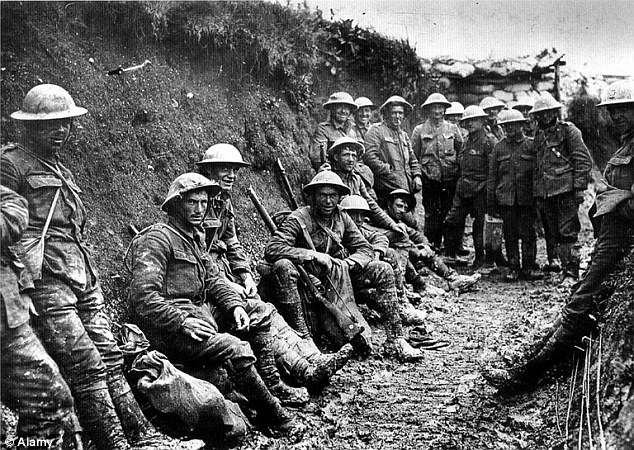Veterans Day
Veterans Day, which we celebrate today, was originally Armistice Day, set up to mark the end of the war that began 100 years ago. Few wrote as powerfully about the soldier’s perspective as Wilfred Owen, who died a week before the armistice, so of course I must share one of his poems.
“Apologia Pro Poemate Meo” means “a defense of my poem” although maybe Owen means his war poetry in general. It’s a particularly challenging poem for those accustomed to Owen’s searing indictment of war. In this one he seems to celebrate the comradeship of soldiers, even though it is a bonding that sometimes occurs when they are “slash[ing] bones bare.” In other words, there is something problematic about the emotions that the soldiers feel.
Sometimes the emotions seem genuinely uplifting, however. The poet says that he sees “God through mud,” explaining that the smiles shining through the muddy visages of his fellow soldiers are sometimes truly “seraphic.” In the trenches he has seen eyes lit up in glory (a word that Owen savagely attacks in “Dulce et Decorum Est” but seems to embrace here), and he has heard laughter that is as innocent and heartfelt as a child’s. He has “perceived much beauty/In the hoarse oaths that kept our courage straight,” and he has “heard music in the silentness of duty;/Found peace where shell-storms spouted reddest spade.” The fellowship he has with his comrades, meanwhile, is a tighter bond than any that is established through kisses and loving eyes. These ties, after all, involve “war’s hard wire” and tight bandages.
But lest it sound as though he is only celebrating the comradeship, Owen also describes some of the more dubious aspects of soldier bonding. For instance, there is an exhilarating sense of collective power that comes from killing:
For power was on us as we slashed bones bare
Not to feel sickness or remorse of murder.
Perhaps the poem explains that his poetry comes from a space that non-combatants will never be able to comprehend. It is beyond understanding that genuine laughter, joy, love, beauty, peace, and fellowship can be found in “the sorrowful dark of hell.” In the last line he says that we non-soldiers are not worth the soldier’s merriment, which may mean that he’s telling his fellow soldiers that our lack of understanding is not worth making fun of. Soldiers, don’t waste your sardonic laughter upon uncomprehending civilians.
But we, at least can give them our tears.
Apologia Pro Poemate Meo
By Wilfred Owen
I, too, saw God through mud–
The mud that cracked on cheeks when wretches smiled.
War brought more glory to their eyes than blood,
And gave their laughs more glee than shakes a child.
Merry it was to laugh there–
Where death becomes absurd and life absurder.
For power was on us as we slashed bones bare
Not to feel sickness or remorse of murder.
I, too, have dropped off fear–
Behind the barrage, dead as my platoon,
And sailed my spirit surging, light and clear,
Past the entanglement where hopes lie strewn;
And witnessed exhultation–
Faces that used to curse me, scowl for scowl,
Shine and lift up with passion of oblation,
Seraphic for an hour, though they were foul.
I have made fellowships–
Untold of happy lovers in old song.
For love is not the binding of fair lips
With the soft silk of eyes that look and long.
By joy, whose ribbon slips,–
But wound with war’s hard wire whose stakes are strong;
Bound with the bandage of the arm that drips;
Knit in the welding of the rifle-thong.
I have perceived much beauty
In the hoarse oaths that kept our courage straight;
Heard music in the silentness of duty;
Found peace where shell-storms spouted reddest spate.
Nevertheless, except you share
With them in hell the sorrowful dark of hell,
Whose world is but a trembling of a flare
And heaven but a highway for a shell,
You shall not hear their mirth:
You shall not come to think them well content
By any jest of mine. These men are worth
Your tears: You are not worth their merriment.


